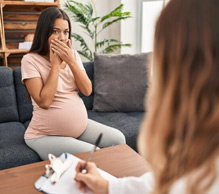What is Perinatal Mental Illnesses?
Perinatal mental illnesses can have a severe impact on women’s lives, affecting their ability to bond with their babies, care for themselves and their families, and cope with the demands of everyday life. They can also increase the risk of suicide and self-harm or even harm to the baby.
Types of perinatal mental illnesses :
There are many different types of perinatal mental illnesses, but the most common are
Perinatal Depression
This is a feeling of sadness, hopelessness, and despair that
Perinatal Anxiety
This is a feeling of worry, nervousness, or unease that
Obsessive-Compulsive Disorder (OCD)
This is a mental disorder
Postpartum Psychosis
This is a rare but serious mental illness that can cause women
How is it diagnosed?


The doctor or the mental health professional diagnoses the existence of PPD using a screening questionnaire such as the Edinburgh Postnatal Depression Scale, which rates mood and activity levels over a time span of seven days. However, sharp clinical judgment is required to interpret the questionnaire.


Symptoms
The symptoms of perinatal mental illnesses can vary from woman to woman, but some common symptoms include :

Mood Changes
Feeling sad, hopeless, or irritable

Changes in Appetite or Sleep
Eating too much or too little, or sleeping too much or too little

Loss of interest in activities you used to enjoy

Difficulty concentrating or making decisions

Feeling overwhelmed or on edge

Thoughts of harming yourself or your baby
Treatments
Treatment for perinatal mental illnesses may include:

Psychotherapy
This can help women to understand their symptoms and develop coping mechanisms.

Medication
This may be prescribed to relieve symptoms of depression, anxiety, or OCD.

Support Groups
These can provide women with a safe space to talk to other women who are going through the same thing.
Postpartum psychosis
Postpartum psychosis is a rare but critical mental illness that can affect women in the first few weeks after childbirth but may as well begin up to six months after birth. Symptoms of postpartum psychosis can include:

Loss of Touch With Reality
This may involve seeing or hearing things that are not there or having delusions

Confusion and Disorientation
This may involve not knowing where you are or who you are or having difficulty understanding what is happening around you.

Mood Swings
This may involve feeling very happy or excited one minute and very sad or depressed the next.

Changes in Behaviour
This may involve acting strangely or impulsively or neglecting your baby
